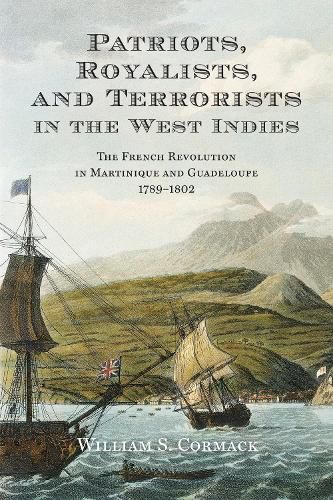Readings Newsletter
Become a Readings Member to make your shopping experience even easier.
Sign in or sign up for free!
You’re not far away from qualifying for FREE standard shipping within Australia
You’ve qualified for FREE standard shipping within Australia
The cart is loading…






Patriots, Royalists, and Terrorists in the West Indies examines the complex revolutionary struggle in Martinique and Guadeloupe from 1789 to 1802. The arrival of tricolour cockades - badges showing support for the French Revolution - and news from Paris in 1789 undermined the royal governors’ authority, unleashed bitter conflict between white factions, and encouraged the aspirations of free people of colour to equality and black slaves to freedom.
This book provides a detailed narrative of the shifting political developments, and analyses the roles of planter resentment of metropolitan control, social and racial tensions, and the ambiguity of revolutionary principles in a colonial setting. Recent scholarship has tended to over-emphasize the colonies’ agency, and to accentuate the conflict between masters and slaves, while downplaying metropolitan influences. In contrast, this study seeks to restore the importance of destabilizing political struggles between white factions. It argues that metropolitan news, ideas, language, and political culture - the revolutionary script from France - played a key role in shaping the revolution in the colonies.
$9.00 standard shipping within Australia
FREE standard shipping within Australia for orders over $100.00
Express & International shipping calculated at checkout
Patriots, Royalists, and Terrorists in the West Indies examines the complex revolutionary struggle in Martinique and Guadeloupe from 1789 to 1802. The arrival of tricolour cockades - badges showing support for the French Revolution - and news from Paris in 1789 undermined the royal governors’ authority, unleashed bitter conflict between white factions, and encouraged the aspirations of free people of colour to equality and black slaves to freedom.
This book provides a detailed narrative of the shifting political developments, and analyses the roles of planter resentment of metropolitan control, social and racial tensions, and the ambiguity of revolutionary principles in a colonial setting. Recent scholarship has tended to over-emphasize the colonies’ agency, and to accentuate the conflict between masters and slaves, while downplaying metropolitan influences. In contrast, this study seeks to restore the importance of destabilizing political struggles between white factions. It argues that metropolitan news, ideas, language, and political culture - the revolutionary script from France - played a key role in shaping the revolution in the colonies.